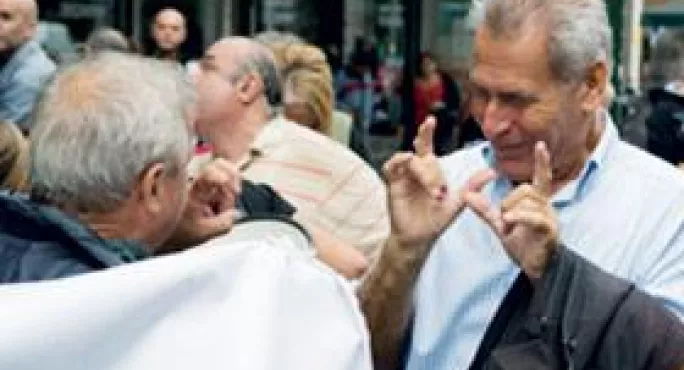Why we should all be more open to interpretation

Silent heckling is not something that many performers at the Edinburgh Festival Fringe will have experienced. But the mock indignation conveyed at one show by dozens of raised hands waving is loud and clear, albeit inaudible.
A man on stage wearing a comedy hat has just made this statement: “If you’re using sign language you’re living in the past. The cost of interpreters for deaf people on access-to-work schemes is outrageous. Just give all deaf people cochlear implants [so they can hear] and it’s done with.”
It is not a popular view with the 100-strong audience, which is roughly half deaf and half hearing. It is also an unexpected statement from the academic leading Scotland’s first undergraduate degree in British Sign Language (BSL) interpreting at Heriot-Watt University in Edinburgh.
But Professor Graham Turner is playing devil’s advocate in a fresh bid to persuade the Scottish government to give BSL parity with other languages. More than 12,500 people in Scotland use BSL at home but fewer than 100 interpreters are registered nationwide.
The interactive, one-off show, Speech Sucks: the Future Signs, is compred by comedian Susan Morrison, with interpreters translating her words into BSL and doing the reverse for Professor Turner and his Heriot-Watt colleague.
The audience includes 10 pupils from Dingwall Academy in Ross-shire, the first school in Scotland to offer BSL as an alternative language option to traditional subjects such as French as part of a deaf studies course. They are here with their teacher to call for BSL qualifications at Higher and National 4 and 5 levels.
Emma Reid, 16, who hopes to use BSL in a future career in journalism or fashion, said: “We got our exam results this week and BSL feels like it has less worth than other subjects as we don’t get a grade because we can’t do a Higher or a National in it.”
Dingwall Academy takes pupils with hearing loss from across the Highlands and first introduced deaf studies as an option for S5 and S6 pupils about 15 years ago. The school currently has about 10 deaf pupils, who are learning to sign alongside 60 hearing classmates on the deaf studies course, which includes a module in BSL at introductory level and level 1.
Margaret Kinsman, principal teacher in deaf studies at Dingwall, said that the growing demand from pupils was “overwhelming” but the lack of qualifications limited their prospects - and those of the wider deaf community.
“Our pupils can only take their studies so far,” she said. “We hope that by coming to the show today we can help to further our campaign for BSL to be available from National 4 and 5.”
The British Deaf Association welcomed the “innovative” show and supported calls for more qualifications, including a GCSE equivalent south of the border.
“It is only through this type of expansive vision that we will inspire people to change their mindsets around the perceptions of BSL [which is] critical to aid access for deaf people and to deliver vital social services,” a spokeswoman said.
BSL is widely recognised as a language with its own grammar, and campaigners have welcomed support from the Scottish government, including some pound;750,000 in 2012 for the new Heriot-Watt degree course. A bill aiming to secure BSL’s status as an officially recognised language, proposed by Labour MSP Mark Griffin, is due to come before Parliament later this year.
The Fringe show was part of the Cabaret of Dangerous Ideas festival programme, where experts raise serious issues in unusual ways.
The Scottish Qualifications Authority said it had “no plans” to develop a BSL Higher. A spokesman added that it already offered a number of stand-alone units, including one at SCQF level 6 which provided “a similar level of challenge” to a Higher.
The government said it recognised BSL as one of Scotland’s “vital and vibrant languages”. A spokeswoman added: “We’ve provided pound;300,000 funding to support work to identify provision of BSL across public services to ensure we have the capacity to support people with hearing impairments all across Scotland.
“We’ve also provided funding to ensure that BSL users can participate in policy and decision-making, and we are encouraging others to follow our lead.”
Keep reading for just £1 per month
You've reached your limit of free articles this month. Subscribe for £1 per month for three months and get:
- Unlimited access to all Tes magazine content
- Exclusive subscriber-only stories
- Award-winning email newsletters


